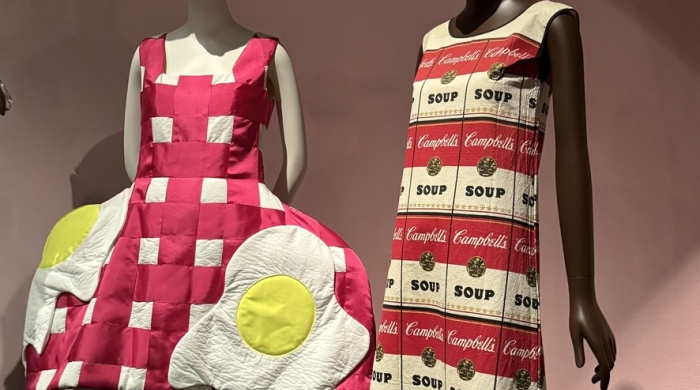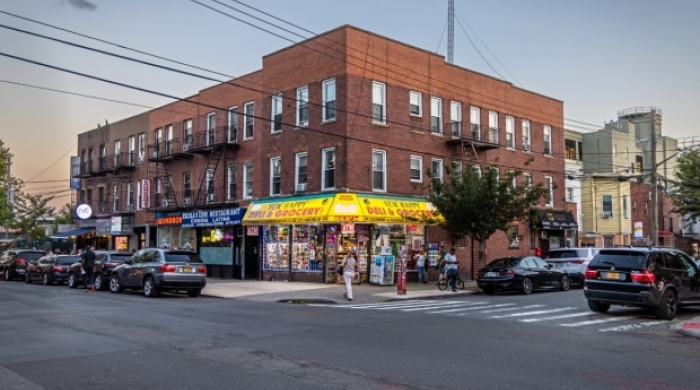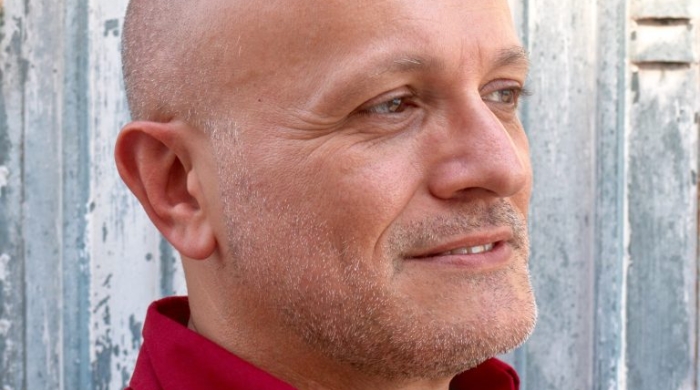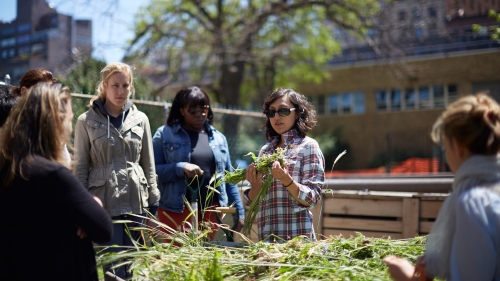In this alumni profile, Scarlett Lindeman (MA ’10, Food Studies) shares how her restaurant in Mexico City came to be and recounts how her experiences at NYU shaped her career.
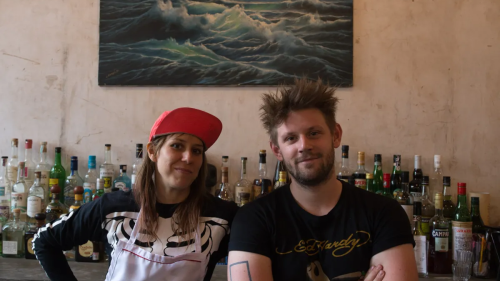
Scarlett Lindeman began working summer jobs in the kitchen as a cook at the age of 15, where she formed friendships with colleagues who were Mexican immigrants. Her desire to speak Spanish and understand Mexican culture grew from there. “I wanted to understand what the experience was of uprooting your life and moving to another country and the strife and the cultural friction that comes with it, which is incredible to me. Plus, we share our southern border with Mexico, so I wanted to know more.”
This desire to become fluent and learn more became formative in Scarlett’s path to eventually opening her restaurant, Cicatriz, in Mexico City with her brother Jake Lindeman (TSOA ’14) many years later. Before this, Scarlett and Jake spent their youth in different parts of the world, including a year in Berlin. Their parents' careers as academics working in higher education influenced a lot of their migration path: from NYC to New Brunswick, Salt Lake City, Berlin, Los Angeles, back to NYC, and finally Mexico City. This primed Scarlett and Jake for a willingness to take on the unique challenges of uprooting their lives to Mexico City and starting a business there.
The food at Cicatriz is a testament to this lived experience; while the menu’s reference points are mostly from the US, there are Mexican influences in touchstones bringing all-year-round vibrant dishes. Cicatriz has a casual cafe atmosphere, and while their menu is mostly vegetable-focused, they have a “fried chicken sandwich that pays the rent.” It’s also known for its natural wine program, which was one of the first in the city and started by Jake. Ask them about their agave distillates and mezcal.
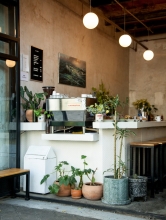
Interior of Cicatriz
Cicatriz, which means scar in English, was born out of the things that the sister and brother duo missed having from NYC and the US, and the things they couldn’t find in Mexico City: “Like a dive-bar-style combo beer and shot just didn’t exist down here, fried chicken, big salads, or roasted veggies,” says Scarlett when asked about what inspired the menu. She also shared, “I naively thought, along with Jake, that opening a restaurant in Mexico City would somehow be easier and cheaper than in the US; which is not true. What you make up for in costs, you definitely lose in time.”
“The hardest thing about owning a restaurant in Mexico City is some of the structural deficiencies that exist, which is incredible and beautiful, but also deranged and catastrophic. Often municipal systems just do not work, like water, drainage, and the electrical grid. A lot of these citywide, structural constraints make it challenging to operate a small business at times.”
“With a population of 22 million people, it’s a remarkable feat that the city is able to operate the way that it does. I’m constantly amazed and impressed by the resilience of the community here and of the beauty born out of real strife and struggle and how kind and open the country and city has been to me as a foreigner. It is at once inexhaustible and inspiring.”
Scarlett is a cook by trade with the heart of an academic. Throughout her undergrad and graduate years in Los Angeles and then New York City, respectively, she continued to work in kitchens to pay for school and rent. When asked about what her time at NYU was like, she says, “NYU’s Food Studies program at Steinhardt was such a perfect confluence of the way in which I had been thinking and studying from my undergraduate career in LA; finding a program that was so specific to my interests felt really special. Plus, my professors were a big highlight of my time there.”
Besides her studies at NYU, she also spent a lot of time visiting Mexican restaurants, tortillerias, mole producers, and Mexican enclaves throughout the boroughs with an ethnographic perspective of what it means to migrate and cook Mexican food in New York; “for example, why Mexican food in NYC is so much different than in Los Angeles or in parts of Texas or Chicago. To me, it’s related to patterns of migration and the specific history in those different locations.”

After grad school, the director of the NYU Steinhardt Food Studies program, Krishnendu Ray, suggested Scarlett go for a PhD, and she decided on CUNY’s Gradudate Center to study sociology, at which point she formally left the kitchen. Although she was no longer cooking professionally, food was never far from mind; she wrote freelance for various food publications about Mexican food and culture, and how it’s tied to patterns of migration, which was the topic of her doctoral dissertation.
Struggling to pay her NYC rent as an adjunct professor and writer, Scarlett first came to Mexico City as a tourist in 2013 and fell in love with the city. She ended up spending the entire summer finishing her dissertation and writing project and ultimately decided to stay. With a few friends and her brother Jake, they opened a restaurant, which resulted in her return to the kitchen after a long break. “Cicatriz initially started as a small organization that would feed and sustain us and our employees. Fast forward seven years and it has become more than that.” In fact, Cicatriz would transform into an all-day cafe model that would feed the city and become a neighborhood staple; even hosting an event for the NYU Alumni Club in Mexico City a couple years ago.
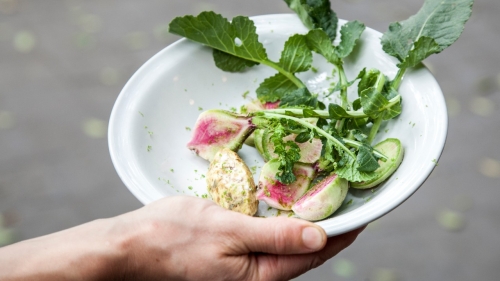
Running Cicatriz has presented the siblings many challenges both professionally and personally, but what stands out most is the mindset change needed to successfully run a business in such a large and sprawling city, seemingly crushed by population and ecological constraints. “It’s taught me a lot as an anal retentive New Yorker who wants something fixed and can easily call someone to come and fix the issue. That doesn’t happen here,” Scarlett laughs as she shares the reality of being a business owner in Mexico City. “Having to be comfortable with that level of uncertainty and inconsistency is something that I learned.” It’s a true lesson in the art of letting go where control is merely an illusion.
The natural follow-up question to this was what the sibling pair love about running a restaurant out of Mexico City, to which Scarlett says, “The exciting part about operating a small business here are those moments of cultural clash that are really just opportunities to have a conversation about likes and dislikes, expectations, and experience.”
As Cicatriz comes up on its 10-year anniversary, Scarlett and Jake sometimes ask themselves, “What’s the longevity of a restaurant and how long is it culturally relevant or viable?” Over the years there have been discussions of “calling it,” sometimes born out of life-altering situations like the Covid pandemic, which Scarlett shares was “so disruptive and catastrophic” that they had to start from zero afterwards. There’s a sense of ephemerality built into Scarlett and Jake’s business model that doesn’t seem as common in the States where permanence is usually the goal. An ephemeral business model seems to be a concept that stops at the border.
Scarlett’s advice to NYU alumni looking to start a business? “Use your naivete to carry you through the opening stage, because until you actually do it, you don’t really understand what it entails.”
Related Articles
Nutrition and Food Studies Research Benefits New York Communities
This is the first in a series of articles highlighting how Nutrition and Food Studies faculty are combining research insights and applied expertise to bring positive change to New York City.
Online Food Shopping Exploded during the COVID-19 Pandemic. Can It Catch On with Bodegas?
Research by assistant professor of nutrition Angela Trude reveals that Bronx bodega owners and customers are excited about online shopping but say cost, technology, and trust are barriers.
“Gastronativism” Wins 2023 Gourmand World Cookbook Award
The book by Professor of Nutrition and Food Studies Fabio Parasecoli explores the ideological use of food to advance ideas about who belongs to a community and who does not.
Related Programs
Related Department
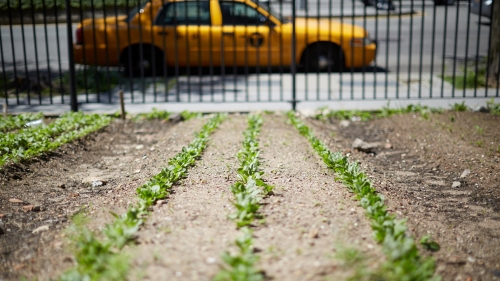
Nutrition and Food Studies
411 Lafayette Street, 5th Floor
New York, NY 10003
Phone: 212-998-5580
Email: nutrition@nyu.edu

